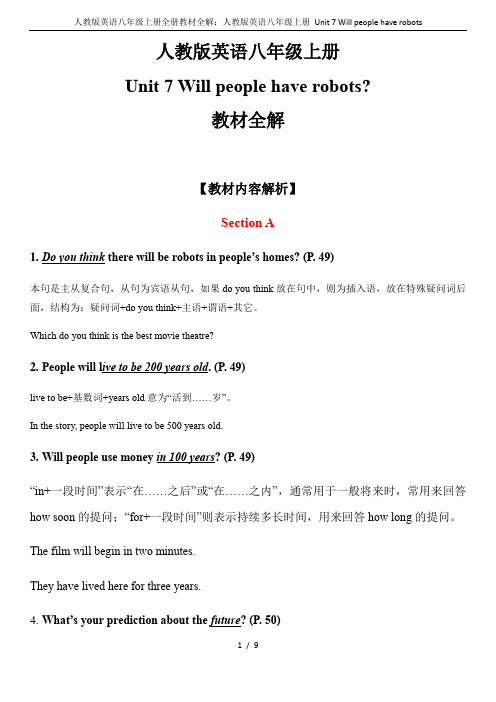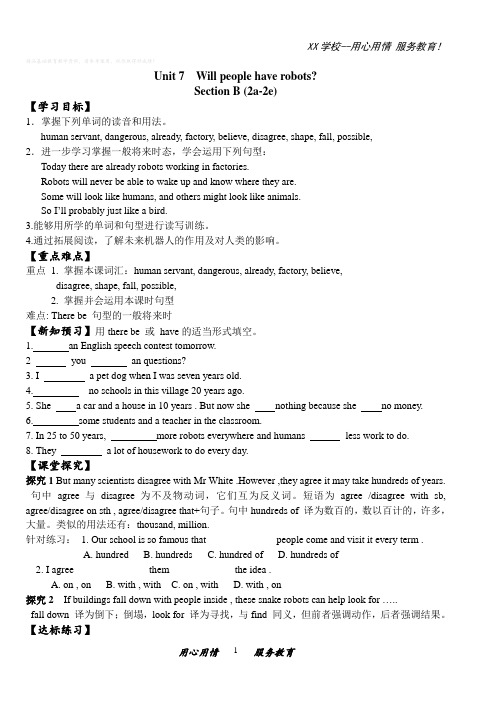2019年人教新目标版英语八年级上册Unit7 Will people have robots Section B优质课课件
人教新目标八年级英语上册教案Unit7Willpeopleha15

精品基础教育教学资料,请参考使用,祝你取得好成绩!Will people have robotsThe Fourth Period Section B ( 2a–2e)Teaching aims(教学目标)1.让学生熟悉未来机器人的话题并以此展开阅读活动。
2.培养学生通过略读判断段落大意以获得对文章的整体理解的能力。
3.通过文章阅读提高scanning/skimming阅读策略能力。
Teaching steps(教学步骤)1. Predicting – work on 2a.Show Ss the pictures of some robots and what they can do on the screen.Have Ss get into pairs and tell their partner what they know about robots now. What do they look like and what can they do?Then ask ea ch pair to draw a picture about how they think robots will look like in the future.(设计意图:通过预测,培养学生的预测能力,同时也让学生对机器人的形状和作用有一个比较直观的初步了解,调动学生对阅读材料的期待感。
)2. Work on 2b.SkimmingHave Ss look at the article on page 53 and read it. Then, ask them to match each paragraph with the question it discusses.3. Work on 2c.ScanningHave Ss read the article again quickly. Then have them work in pairs on 2c and complete the sentences about what robots can do now.(以两人一组为单位询问组内成员的情况。
人教版英语八年级上册全册教材全解:人教版英语八年级上册 Unit 7 Will people hav

人教版英语八年级上册Unit 7 Will people have robots?教材全解【教材内容解析】Section A1.Do you think there will be robots in people’s homes? (P. 49)本句是主从复合句,从句为宾语从句,如果do you think放在句中,则为插入语,放在特殊疑问词后面,结构为:疑问词+do you think+主语+谓语+其它。
Which do you think is the best movie theatre?2.People will l ive to be 200 years old. (P. 49)live to be+基数词+years old意为“活到……岁”。
In the story, people will live to be 500 years old.3.Will people use money in 100 years? (P. 49)“in+一段时间”表示“在……之后”或“在……之内”,通常用于一般将来时,常用来回答how soon的提问;“for+一段时间”则表示持续多长时间,用来回答how long的提问。
The film will begin in two minutes.They have lived here for three years.4.What’s your prediction about the future?(P. 50)future作名词,表示“将来、未来”,in the future表示“在将来”。
Who knows what will happen in the future.5.I don’t think so.(P. 50)I don’t think so表示“我不这么认为”,肯定形式为I think so。
---Look at the cloud. It is going to rain.---I don’t think so. It will be sunny soon.【拓展】类似的结构还有:I hope so“我希望如此”,I hope not“我希望不是这样”,I’m afraid so“恐怕如此”,I’m afraid not“恐怕不是这样的”。
人教新目标八年级英语上册教案Unit7Willpeopleha

精品基础教育教学资料,请参考使用,祝你取得好成绩!Unit 7 Will people have robots?Section B (2a-2e)【学习目标】1.掌握下列单词的读音和用法。
human servant, dangerous, already, factory, believe, disagree, shape, fall, possible,2.进一步学习掌握一般将来时态,学会运用下列句型:Today there are already robots working in factories.Robots will never be able to wake up and know where they are.Some will look like humans, and others might look like animals.So I’ll probably just like a bird.3.能够用所学的单词和句型进行读写训练。
4.通过拓展阅读,了解未来机器人的作用及对人类的影响。
【重点难点】重点 1. 掌握本课词汇:human servant, dangerous, already, factory, believe,disagree, shape, fall, possible,2. 掌握并会运用本课时句型难点: There be 句型的一般将来时【新知预习】用there be 或have的适当形式填空。
1. an English speech contest tomorrow.2 you an questions?3. I a pet dog when I was seven years old.4. no schools in this village 20 years ago.5. She a car and a house in 10 years . But now she nothing because she no money.6. some students and a teacher in the classroom.7. In 25 to 50 years, more robots everywhere and humans less work to do.8. They a lot of housework to do every day.【课堂探究】探究1 But many scientists disagree with Mr White .However ,they agree it may take hundreds of years. 句中agree 与disagree 为不及物动词,它们互为反义词。
人教新目标英语八年级上册Unit7知识讲解+练习题(含答案)

人教新目标英语八年级上册Unit 7 Will people have robots?词句精讲精练词汇精讲1. duringduring是介词,意为“在……期间”。
例如:I went to see my uncle during my stay in Beijing. 我在北京逗留期间去北京看我叔叔了。
【拓展】during;in与for(1) during指“在……时间内,在……的期间”。
谓语动词常为表示持续性的动作或状态的动词,时间段前常有限定词(the; 物主代词等),表特指。
例如:He asked many questions during the three meetings. 在这三次会议期间,他问了许多问题。
(2) in意为“在……时间内”,一般情况下可以和during互换,用in时往往强调某一动作发生在某一时间段中的某一时间点;during既可表示“在整个时间段期间”,也可表示“某时间段内的某个时间点”。
例如:Mike put his hand up three times during/in the class. 在这节课内,Mike举了三次手。
(3) for意为“(时间)长达……”,强调时间由始至终,动作也贯穿这段时间的始终,可以和完成时连用。
强调持续时间的长短,回答how long的提问;而during则是指动作所发生的时间,回答when的提问。
例如:He stayed in Beijing for two years. 他在北京住了两年。
He swims every day during the summer. 夏天他每天去游泳。
2. in 100 yearsin 100 years意为“100年之后”,是由“介词in + 一段时间”构成,表示“在……之后”,多用于一般将来时。
对此短语提问时常用how soon。
例如:I will finish the task in two hours. 我将在两个小时后完成这项任务。
2019年秋人教新目标八年级英语上册教案设计:Unit 7 Will people have ro

2019年秋人教新目标八年级英语上册教案设计:Unit 7 Will people have robots第五课时Section B (2a-Self Check)第五课时Section B (2a-Self Check)uring dayfly up into the skyink you will have your own robots?even be able to talk like human in 25 to 50I think students won't need dictionaries because a robotStep 1自主学习【新词自查】根据句意及汉语提示完成句子。
1.The robot can do many things like a __servant__(仆人).2.My father is making many robots in this __factory__(工厂).3.My brother is very clever and he can make model planes with different kinds of __shapes__(形状).4.We can visit many museums __during__(在……期间) the vacation to Beijing.5.The girl __probably__(很可能) doesn't know who her father really is.6.In China,there are several special traditional __holidays__(假期).Step 2情景导入【参考案例】1.T leads in the new words by some example sentences.The main new words:human,servant,dangerous,already,factory,believe,disagree,even,shape…2.T says to the Ss “Tell your partner what you know about robots.What do they look like and what can they do?”设计意图:通过导入学习新单词,为后面的阅读扫清基本词汇障碍。
人教新目标八年级英语上册教案Unit7Willpeopleha

精品基础教育教学资料,请参考使用,祝你取得好成绩!Unit 7 Will people have robots?(第2课时)一、教学目标:1.学习掌握下列词汇:peace, sea, sky2. 进一步复习巩固运用Section A 部分所学的生词和词组。
3. 进一步学习运用所学的知识来陈述自己对将来的看法;学会谈论自己对将来的预言。
4. 掌握情态动词will来表达一般将来时态这一语法知识。
二、教学重难点1. 教学重点:1) 进一步学习运用所学的知识来陈述自己对将来的看法;学会谈论自己的对将来的预言。
2) 掌握情态动词will来表达一般将来时态这一语法知识;并运用所学的知识来表达将来的活动。
2. 教学难点:掌握情态动词will来表达一般将来时态这一语法知识;三、教学过程Ⅰ. Warming- up and revision1. Have a dictation of the new words learned in the last class.2. Ask some Ss to give some predictions.T: What’s your prediction about the future?S1: There will be less free time.S2:There will be more pollution.3. Role-play the conversation in 2d.Ⅱ. Grammar Focus.1. 学生阅读Grammar Focus中的句子,然后做填空练习。
①将来会是什么样子?② What ______the ____ be _____?城市污染将会更多。
且树木将会更少。
Cities ____ ___ _____ polluted. And there ____ _____ _______.③一百年后,人们会使用钱币吗?____ people ____ money ___ 100 years?④不会的。
人教版新目标八年级英语上册Unit 7讲义及重点总结

新目标八年级上册Unit 7 Will people have robots? 讲义一、词性转换1.paper n. 纸张(不可数)2.pollution n. 污染物pollute v. 污染3.prediction n. 预言;预测predict v. 预测4.astronaut n. 宇航员5.dangerous a. 有危险的danger n. 危险6.disagree v. 不同意7.possible a. 可能的impossible a. 不可能的8.probably adv. 很可能二、短语归纳1.play a part 参加(某事)2.space station 太空站3.over and over again 多次;反复地4.hundred of 许多;大量5.fall down 突然倒下;跌倒6.look for 寻找;寻求7.in great danger 在巨大的危险中8.help with 帮助9.for example 举例10.in the future 在未来11.look like 看起来像12.wake up 醒来13.fewer people更少的人14.14. less free time更少的空闲时间15.15. in ten years 10年后(提问用How soon)16.fall in love with…爱上…17.hundreds of +名词复数数百/几百(概数,类似还有thousands of; millions of)18.the same as 和……相同19.A be different from B A与B不同20.wake up醒来21.get bored变得厌倦(get/become+形容词)22.keep a bird 养一只鸟23.lots of /a lot of许多+可数或不可数名词24.disagree with sb.不同意某人(的意见)disagree on sth. 不同意某事25.I don’t agree. = I disagree.我不同意26.on vacation度假27.help sb with sth 帮助某人做某事28.live in an apartment住在公寓里live on the earth 住在地球上29.besides与except =but(除…之外,不包括)30.be able to与can 能、会31.live on a space station 住在空间站32.over and over again 一次又一次33.10 years from now 今后10年34.be difficult to do 做……有困难35.the same …as 和……一样三、重难点深度解析1. Do you think there will be robots in people's homes? 你认为将来人们的家里会有机器人吗?Do you think...? 结构通常用来征求对方的意见或看法,后面接宾语从句,从句用陈述语序。
人教新目标版英语八上Unit7《Willpeoplehaverobot》(Period5)说课稿

人教新目标版英语八上Unit 7《Will people have robot》(Period 5)说课稿一. 教材分析人教新目标版英语八上Unit 7《Will people have robot》(Period 5)是一篇关于未来科技发展对人类生活影响的话题。
本节课主要围绕未来社会机器人与人类的互动,探讨了机器人在日常生活中的应用以及可能带来的挑战。
教材通过丰富的情景设置和任务型活动,引导学生学会用一般将来时谈论未来,提高学生的预测能力和创新思维。
二. 学情分析八年级的学生已经掌握了基本的英语语法知识,具备一定的听说读写能力。
他们对未来科技发展充满好奇,具有较强的求知欲和创新精神。
但同时,部分学生对英语学习中存在恐惧心理,缺乏自信心,且在未来题材的理解上存在一定的困难。
三. 说教学目标1.知识目标:学生能够掌握一般将来时的基本结构,运用一般将来时谈论未来。
2.能力目标:学生能够通过听力、阅读和交流,提高对未来科技的预测和创新思维能力。
3.情感目标:学生能够树立正确的科技观,认识到科技发展对人类生活的影响,激发学生热爱科学、探索未知的热情。
四. 说教学重难点1.重点:学生能够运用一般将来时谈论未来,掌握一般将来时的基本结构。
2.难点:学生能够在未来题材的语境中准确运用一般将来时,表达自己的观点和预测。
五. 说教学方法与手段1.教学方法:采用任务型教学法,通过听力、阅读、讨论、汇报等环节,引导学生主动探究、积极参与。
2.教学手段:利用多媒体课件、网络资源、图片等辅助教学,提高学生的学习兴趣和参与度。
六. 说教学过程1.导入:以一张有趣的机器人图片引发学生对未来的想象,激发学生的学习兴趣。
2.听力活动:播放一段关于未来机器人的听力材料,学生听后回答相关问题,培养学生获取信息、处理信息的能力。
3.阅读理解:学生阅读一篇关于未来机器人的文章,通过回答问题、小组讨论等方式,提高学生的阅读理解和批判性思维能力。
- 1、下载文档前请自行甄别文档内容的完整性,平台不提供额外的编辑、内容补充、找答案等附加服务。
- 2、"仅部分预览"的文档,不可在线预览部分如存在完整性等问题,可反馈申请退款(可完整预览的文档不适用该条件!)。
- 3、如文档侵犯您的权益,请联系客服反馈,我们会尽快为您处理(人工客服工作时间:9:00-18:30)。
1a Write each word in the correct column below.
astronaut house train rocket computer programmer
apartment space station
1c Listen to Alexis and Joe. Number the pictures [1-3].
2
3
1
1d Listen again. Fill in the blanks with the
correct verbs in the box. am live work will be will live lived took
B: I will live on a space station.
2a Tell your partner what you know about robots. What do they look like and what can they do?
What do they look like?
They look like humans.
What does it look like?
It looks like a dog.
This robot looks like a huge arm.
What will robots do for us in the future?
Let’s make predictions
B: I took train to school.
In 10 years
A: what will your life be like in 10 years?
B: oh, I think I’ll be an astronaut.
A: Where will you live in 10 years?
Jobs
astronaut computer programmer
Transportati Places to house on train rocket live
apartment space station
1b Think of other words and write them in the chart in 1a.
Jobs
astronaut computer programmer
robot cleaner super policeman
Transportati Places to on live
train rocket
space ship helicopter (直升机)
house apartment space station flat(公寓) shelter (避难所)
Do You Think You Will Have Your Own Robot? 1.When we watch movies about the future, we sometimes see robots. They are usually like human servants. They help with the housework and do jobs like working in dirty or dangerous places. 2.Today there are already robots working in factories. Some can help to build cars, and they do simple jobs over and over again. Fewer people will do such jobs in the future because they are boring, but robots will never get bored.
5. I
6. I
the train to school.
will be an astronaut. will fly rockets to the moon. will live on a space station.
7. I
8. I
1e Student A is Alexis and Student B is Joe. Talk about Joe’s life now, 10 years ago and 10 years from now.
will fly
1. I live in an apartment across the street from here. 2. I ________ work near here. 3. I _______a computer programmer. am
4. We
lived
in a house in the country.
A: Where do you live? B: I live in an apartment.
10 years ago
A: Where did you live 10 years ago?
B: I lived in Greenville.
A: How did you get to school?
After 100 years….
speak
do exercise
play the piano
run
cook
play football
dance
help people do the most unpleasant jobs
help with the housework
2b Read the article and match each paragraph with the question it discusses.
Para 1
will robots think like humans in
the future?
Para 2
what will robots be like in the future?
Para 3 Para 4
what can robots do today? what are robots like in movies?
